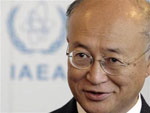 AP: The U.N’s top nuclear official expressed concern Tuesday that Iran may be secretly continuing work on nuclear weapons while his agency is tied up in protracted negotiations with the country on restarting an investigation into past suspected research and development of such arms. The Associated Press
AP: The U.N’s top nuclear official expressed concern Tuesday that Iran may be secretly continuing work on nuclear weapons while his agency is tied up in protracted negotiations with the country on restarting an investigation into past suspected research and development of such arms. The Associated Press
By By GEORGE JAHN, Associated Press Writer
 VIENNA (AP) — The U.N’s top nuclear official expressed concern Tuesday that Iran may be secretly continuing work on nuclear weapons while his agency is tied up in protracted negotiations with the country on restarting an investigation into past suspected research and development of such arms.
VIENNA (AP) — The U.N’s top nuclear official expressed concern Tuesday that Iran may be secretly continuing work on nuclear weapons while his agency is tied up in protracted negotiations with the country on restarting an investigation into past suspected research and development of such arms.
The comments by International Atomic Energy Agency head Yukiya Amano are bound to resonate with Israel and Western nations, which assert Iran is seeking nuclear weapons capacity even though it insists its atomic activities are transparent and peaceful.
At the same time, critics question the objectivity of the intelligence such assessments are based on, noting most comes from the United States and Israel, Iran’s greatest detractors. They say that if the information cannot be vetted publicly it should at least be shared with Tehran so that the Islamic Republic can see the evidence used to cast suspicion upon it.
Iran denies any secret weapons work — it says its nuclear program is primarily for medical and energy purposes — and skeptics note that even the United States said in 2007 that Tehran had suspended all meaningful weapons development by 2003.
Since then, however, IAEA reports have listed suspicions of tests and experiments past that date. Britain, France, Germany and Israel have also said that such work continued beyond 2003. While the United States has not publicly revised its 2007 intelligence assessment, its information remains a mainstay of IAEA assessments such as the one made by Amano on Tuesday.
“We do not know for sure, but we have information indicating that Iran was engaged in activities relevant to the development of nuclear explosive devices in the past and now,” he told The Associated Press in what appeared to be his most specific assertion that such activities are continuing into the present.
While not going into detail , Amano said the IAEA’s information was “cross checked … so we have concerns.”
Iran has dismissed the intelligence seen by the agency as faked and has demanded access to it. On Tuesday, Ali Asghar Soltanieh, Iran’s chief IAEA delegate, cut short a telephone call from the AP seeking reaction.
Asked to comment on Amano’s remarks, nuclear scientist Yousaf Butt of the Monterey Institute of International Studies, who frequently questions how seriously the IAEA’s information should be taken without outside scrutiny, said Tehran “should be presented with any such evidence so it can respond to it.”
Amano spoke three days ahead of a renewed round of nuclear talks between Iran and six world powers in Kazakhstan that are meant to reconcile the two sides’ widely differing demands.
Iran wants an end to punishing international sanctions imposed for its refusal to suspend uranium enrichment, while the international community is calling on Tehran to curb parts of its enrichment program most suited to providing material for nuclear warheads.
Both sides were cautiously hopeful that differences were slightly narrowed as they emerged from the previous negotiating session in February. Still, any progress at the talks this week will likely be no more than incremental, and as the negotiations drag on the IAEA’s attempts to restart a probe into the suspected secret weapons work is on hold.
Like others previously, the last meeting between Iran and the IAEA on re-launching the investigation ended inconclusively after more than a year of occasional talks on the issue, with agency officials saying a pause was needed. Amano on Tuesday said his agency was now “ready to continue … the dialogue” with Iran, even without expectations of progress.
Iran’s alleged secret weapons work and its expanding uranium enrichment program are the two greatest issues of concern about Tehran’s nuclear activities.
On Tuesday, Amano said there was “some possibility” that Iran may already be constructing additional sites to enrich uranium at locations unknown to the agency, based on an announcement by Tehran that they plan to build around 10 such additional facilities.
But he said the agency does not have specifics about whether work on such installations has actually started, with Iran not answering requests for “further information in this regard.”


